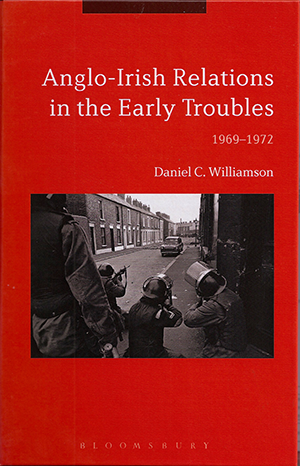Anglo-Irish relations in the early Troubles, 1969–1972
Published in Book Reviews, Book Reviews, Issue 3 (May/June 2017), Reviews, Volume 25DANIEL C. WILLIAMSON
Bloomsbury
£76.50
ISBN 9781474216968
Reviewed by: Richard English
 Amid current frustrations regarding politics in Northern Ireland, it is vital to recall what genuine crisis in the North has actually involved. Daniel C. Williamson’s lucid and fair-minded study of Anglo-Irish relations during the early phase of the Northern Ireland Troubles offers helpful insight here.
Amid current frustrations regarding politics in Northern Ireland, it is vital to recall what genuine crisis in the North has actually involved. Daniel C. Williamson’s lucid and fair-minded study of Anglo-Irish relations during the early phase of the Northern Ireland Troubles offers helpful insight here.
The book carefully narrates the evolution of relations between Dublin and London as the sullen cold war of pre-Troubles Ulster descended rapidly into bloodstained civil war between 1969 and 1972. It is based on some good research in the archives, and is a valuable addition to the shelf of accounts of this era from scholars such as Roy Foster, Catherine O’Donnell, Thomas Hennessey, Stephen Kelly, Dermot Keogh, Alan MacLeod and Justin O’Brien.
Williamson points out that pre-1960s Northern Ireland rarely surfaced as an issue at Westminster, and he makes clear that it was only the violent conflict in the North that prompted London to become more fully engaged and more aware of the need for cooperation with Dublin. The August 1969 suggestion by British Foreign Secretary Michael Stewart that Northern Ireland was a strictly internal UK matter and of no concern to the Irish government was one that could not withstand the conflict that was to emerge over the years that followed.
Equally, it took the disastrous collapse of order in Northern Ireland to prompt Irish governments to develop a more serious appreciation of Northern realities, and to begin to move away from naïve assumptions about how easily Irish unity could be reconciled with unionist opinion.
The book makes clear how far internal politics within each state affected high-level engagement with Northern Ireland. Jack Lynch had to look over his shoulder at the greenest wing of Fianna Fáil as he responded (with ‘essential moderation’) to the eruption of violence north of the border; similarly, London had to be aware of deep Orange possibilities in Ulster if its own reaction to the emerging Troubles was to be judged too lenient towards republicans.
Williamson repeatedly makes clear the initial conviction in Dublin that Irish reunification could be achieved with unionist cooperation; he also makes clear that there is no substantial evidence to suggest that Dublin was justified in such a reading of the situation. Nothing in the book, for example, suggests that Irish minister Patrick Hillery was right to claim that moderate Northern unionists could be persuaded to support reunification if the British withdrew. Williamson also shows how far there emerged a sensible recognition on both sides—Irish and British—that politically necessary public statements and politically accurate private assessments could coexist, despite the frequent tension that existed between them.
The author is balanced in his analysis, and the treatment of emotionally charged episodes such as internment and Bloody Sunday is calm. The situation that he describes was much less so, of course, with violence polarising communities and destroying lives in the unrealistic pursuit of goals that have largely remained unfulfilled.
Importantly, Williamson also recognises how much of the eventual 1990s settlement in the North (power-sharing, cross-border dynamics, enduring and committed dialogue between Dublin and London) was actually sketched out in these early years of the Troubles. Indeed, the ‘diplomatic cooperation between Dublin and London’ which he studies in this book, when ‘combined with a new willingness on the part of the US government to involve itself in the conflict, was vital to the peace process of the 1990s that effectively ended the Troubles’.
Williamson could perhaps have engaged more deeply than he does with the existing scholarly literature. There is far more work on Ulster unionism than his bibliography suggests, and this would have clarified even further the constraints that existed in these years on London’s freedom of movement. Similarly, the wider literature on the evolution of Irish nationalism could have been discussed more fully, since Williamson’s thoughtful analysis reinforces a deeper point about that tradition, concerning its often irenic and pragmatic dimensions. There are also frequent slips in spelling (‘Chichester-Clarke’, ‘Thomas Hennessy’, ‘J. Bower Bell’, ‘Terrence O’Neill’), though that is a more minor point.
Overall, the author suggests that the Anglo-Irish pattern of coming decades was set in these terrible early years of the Northern Ireland conflict. This is a fair point and, while much of the narrative in this study will be well known to History Ireland readers, the book does offer a calm and well-researched assessment of an important phase in Anglo-Irish politics. It also demonstrates how painful and yet how necessary London–Dublin friendship can be amid crisis—a historical point now made much sharper by the Brexit imbroglio that currently defines so much that will happen on either side of the Irish border in coming years.
Richard English is Professor of Politics and Pro-Vice-Chancellor at Queen’s University, Belfast.
















